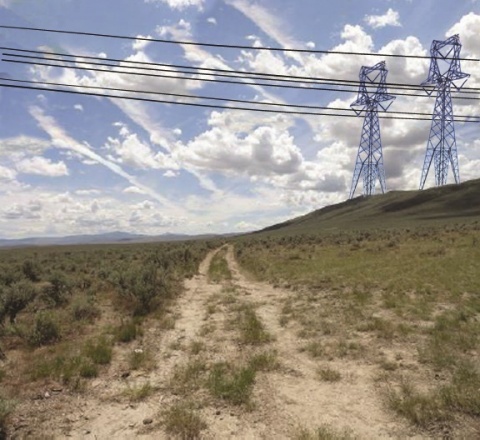INDEPENDENCE, Mo.--(BUSINESS WIRE)--The proposed 300-mile Boardman to Hemingway power line project across Eastern Oregon, from near the Columbia River to the Snake River in Idaho would be an “absolute disaster” for the Oregon National Historic Trail, according to the Oregon-California Trails Association.
For about 260 of its proposed 305-mile route, the project parallels the trail and crosses it as many as 11 times. Construction of a parade of towers up to 195-feet tall, which can be seen for miles, would desecrate not only the remains of the trail itself but compromise the views essential to the experience of the historical legacy, according to William Symms, Preservation Officer of the Northwest Chapter of OCTA. Among the key sites affected would be the Oregon Trail Interpretive Center at Baker City, a major tourist attraction in Eastern Oregon, according to Symms.
An application headed by the Idaho Power Company with help from Bonneville Power Administration and Pacificorp, is now pending with the Bureau of Land Management’s Vale District office in Eastern Oregon. A draft Environmental Impact Statement was issued in December 2014, with public comment closing March 19, 2015. Several OCTA representatives submitted comments. A final EIS is due in early 2016.
“Once it’s gone, historic trail cannot be recreated,” explains Symms. “Over 160,000 emigrants took the trail west to Oregon between 1843 and 1863 —by wagon train, on horseback or on foot. These emigrants founded the territory that became the state of Oregon as we know it today.”
“Congress mandated protection of our historic trails,” he adds. “We don’t see it in that draft EIS.”
As described in the draft EIS, “The B2H project is neither required to support any particular new power generation project nor justified by any particular existing power generation project. Rather, the B2H project would meet Idaho Power’s obligations to meet Federal Energy Regulatory Commission, Oregon Public Utility Commission, and Idaho Public Utility Commission requirements.”
The estimated cost of the project is about $1 billion.
“We urge total rejection of this transmission line project—or at the least reconsideration of the route,” said Symms. “It would rob us of our historical legacy.”
The Oregon-California Trails Association, headquartered in Independence, MO, is the nation’s leading advocate for protection of westward emigration routes during the mid-19th Century.

